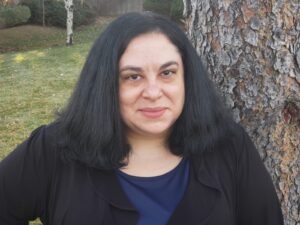
A Pedagogy of Ofrendas in the Time of Pandemic
I believe we can create an altar-like pedagogy that turns the classroom into a sacred space where we nurture our students’ mindbodyspirit, where teaching is acknowledged as a sacred ritual of raising consciousness, and where we pay homage to and connect with the history of our ancestors’ struggle and resistance. — Norell Martínez [1]
By early spring of last academic year, I was done! Having taken on too many administrative projects and an additional teaching load, I was spent in all the ways that one could be depleted—mentally, physically, spiritually, emotionally, and otherwise. My soul was tired. Yet I still had another course to teach in the spring quarter, and it was one that I had not taught previously. At that point, I knew that the best I could offer students was to read some books together and ponder how they related to our praxes of ministry leadership. In all honesty, I hadn’t even fully read all the books prior to the course, but I knew that I was interested in exploring these particular texts for wisdom and challenge and thought the students might have a similar response.
Nevertheless, the course ended up being quite meaningful and engaging, no thanks to my lack of preparation. I tried to read two weeks ahead and prepare video lectures that touched upon the materials just enough to invite critical discussions within our Learning Management System. In our synchronous Zoom sessions, I came as I was, as we all were—tired and overworked, but intrigued and enlivened (and frustrated at times) by the materials we were reading. It was not my best teaching nor my best course design; nevertheless, it was transformative for several students personally and professionally.
To make time this summer for rest and replenishment, I spent several days at a retreat center reading, journaling, and reflecting on the past year in preparation for the next one. While reading, I came across a teaching metaphor that spoke directly into my weary soul and encompassed all of what I had experienced in the last year and a half: a pedagogy of ofrendas (offerings). For Latinxs like me and millions of others around the globe, ofrendas are the things that one gives or sacrifices, usually for the love of and/or loyalty to what we hold most dear—our familia (family), our comunidad de fe (faith community), our gente (people). In our faith communities, we give ofrendas in the forms of money, resources, time, and talents. In broader Latinx cultures across time and location, however, ofrendas are most often shared on altares (altars), the purposes of which are to “create sacred spaces, spaces of prayer and ritual, and sites of offering and memory [. . . ] to connect with our ancestors,” as described by Norell Martínez. Moreover, Martínez argues that we create such sacred spaces—such altares with ofrendas—in our educational work.
Ofrendas include all that we put into our courses in preparation, instruction, and evaluation, as well as our unique embodiments and care for the materials, our students’ transformation and learning, and the creation of just pedagogical spaces. Martínez states this much more eloquently:
The mental and emotional energy we put into our lessons, the pedagogical tools we use. . . and the passion we have for raising consciousness are our ofrendas to our students. Likewise, we teach our students that the work they are doing, the knowledge they produce in our classroom, is their ofrenda.
By envisioning each contribution, we make to the learning experience as an ofrenda on the altar of the course, what is required of us as teachers is expanded beyond fixed notions of what a “proper” course should contain and what roles we should play as main contributors. In addition, no ofrenda is too small and each is experienced as an expression of intentionality and care toward the creation of an altar filled with the beauty of all contributions.
What if I had framed my entire course as an altar and each of our contributions as ofrendas? How might it have created an even more lovely, more sacred space for transformation (while at the same time allowing creative expression and acknowledgement of my own embodiment as a biracial Latina)? Given the world that we were surviving in the moment and the challenges each of us faced, I know now that what we offered collectively was enough; what I as a teacher offered was more than enough. All teaching and learning is altar-making, and my ofrendas only comprise one small part of the altar of any given course. In pandemic life, my ofrendas look different (much smaller, in fact); however, the sacredness of the ofrendas themselves is not diminished and, perhaps, is even increased.
In this next year, especially amidst the continuing uncertainty of COVID-19 strains and infection rates, I am hopeful that practicing a pedagogy of ofrendas will aid in creating the grace-filled space so critical to my own survival and soul care in the work of teaching and learning. Such a pedagogy might itself be a loving ofrenda for students, colleagues, and institutions alike.
[1] This and all other quotes in this piece are from Norell Martínez, “A Pedagogy of Ofrendas: The Altar as a Tool for Integrating Social Justice in the Classroom,” in Voices from the Ancestors: Xicanx and Latinx Spiritual Expression and Healing Practices, eds. Lara Medina and Martha R. Gonzales (Tucson: The University of Arizona Press, 2019), 367-369.
Leave a Reply